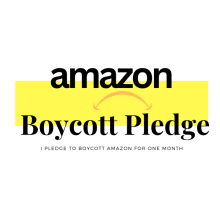Why avoid Amazon?
Amazon has been accused of everything from firing employees for calling out its unsafe conditions to offering services to fossil fuel giants. You can find out more about reasons to avoid the company in our '10 reasons to avoid Amazon' article.
The billion-dollar company scores very poorly across all our ratings based on its ethical and environmental record and comes at the near bottom of most tables where they feature. (See below for a full list of guides that feature Amazon).
Our boycott focuses on Amazon’s staggering tax avoidance. Our research has calculated that in 2023, Amazon’s tax avoidance may have cost around £433million to the UK’s public purse.
In addition, Amazon is also being boycotted by groups around the world for its involvement with the genocide in Gaza, through its Amazon Web Services business.
Amazon’s monopolistic behaviour threatens small businesses trying to do better. Our guides below include more ethical options, so you can ensure you’re not supporting this arch tax avoider while channelling your money to more ethical companies.
What can you do?
You can sign up to your pledge to try to avoid Amazon - we will send you regular emails with tips from others who are reducing their use of Amazon.
Also try some of the alternative companies in our shopping guides.
Plus, contact Amazon and tell them why you are cancelling your Prime subscription or shopping elsewhere, and estimate how much money you haven't spent with them.












